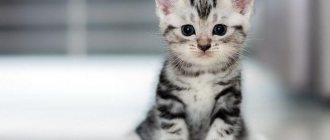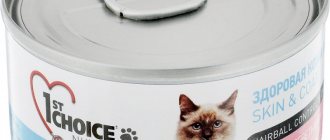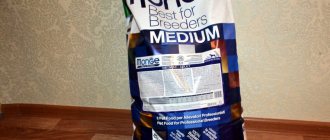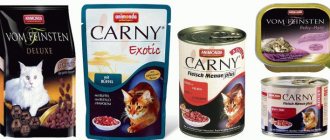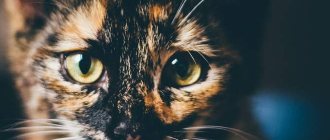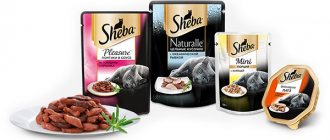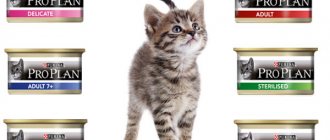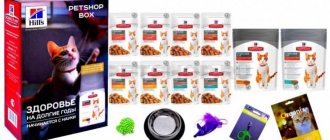We often receive questions from owners, among which one of the most popular is: “We feed our cat a variety of dry food. Is it possible to do this or is it better to choose one brand?” A detailed answer is required here.
First of all, it is worth emphasizing that the creation of dry food was precisely so that it would become the only source of nutrients for domestic animals. The packaging of such products always bears the inscription “complete” or complete feed. Why add something else to a comprehensive diet or alternate between different brands of food? There are several reasons, let's look at them in more detail.
It is not possible to buy the same dry food
This explanation is one of the most common. Owners buy different foods because the range at the nearest pet store is limited and unstable. As a rule, we are not talking about mixing, but about alternating products. What is the danger of such disorderly feeding?
If the food differs significantly in composition, you risk causing a digestive disorder in your cat, which can manifest itself in different ways, and sometimes be completely asymptomatic. When your pet vomits or has diarrhea, it immediately becomes clear that something has gone wrong. But sometimes the problem is not so obvious: mild stool upset and bloating often go unnoticed, but still cause discomfort to the animal and affect the absorption of nutrients, which over time leads to deficiencies of certain elements in the body.
If you are feeding your cat different dry foods, then it is advisable to choose products of equal composition, ideally products from the same line. And the issue of availability of goods today is easily resolved thanks to online trading. For example, Acana and Orijen foods can be ordered from the online stores listed on this page.
Time to keep food in bowl
For wet food, opened packaging should be kept in the refrigerator for no more than 2-3 days. In this case, the food should be transferred to a glass bowl.
It is advisable to store the opened food packaging in the refrigerator, hermetically sealed. Air access contributes to the oxidation of components and loss of their value.
Important! If wet food is in your cat's bowl, you should not leave it all day: it may spoil or dry out, especially if the room is hot.
The shelf life of dry food is usually indicated on the packaging. But it concerns exclusively the hermetically sealed version. However, an open pack of dry food can only be stored for 1.5-2 months. The fact is that the fats in the food are oxidized, which can cause gastrointestinal upset in the pet.
It is better not to leave food in a bowl for a long time
The desire to improve low-quality food at the expense of more expensive food
A popular motive that encourages owners to mix two or more types of ready-made food. In order to save money, cheap food, usually based on cereals, is supplemented with more expensive food with a high meat content. It is assumed that the disadvantages of the first will be compensated by the advantages of the second. Unfortunately, in practice this scheme hardly works.
Firstly, each complete food has its own balanced formula, with a unique composition and ratio of components. Two ingredients that are individually beneficial and recommended for cats may be less digestible in the presence of each other. The consequences are unpredictable - from mild gastrointestinal disorders to serious deficiencies and malfunctions of the body.
Secondly, a diet high in grains itself provokes various diseases in cats: diabetes, urolithiasis (KD), individual food intolerance and other problems.
Finally, there is little point in such a practice. An animal needs more food with a high content of grains to get enough food than a diet based on meat components. We wrote more about this in the article: “How much food does a cat need per month?”
Thus, savings are often illusory. Moreover, when mixed, the beneficial components of expensive food may be less absorbed due to the fact that the “empty” food passes through the gastrointestinal tract at an accelerated rate. As a result, the owner remains even in the red, since he spent in vain on a premium product. Not to mention the high veterinary bills that can come with improper feeding.
Natural nutrition
If you choose a natural type of feeding, then it will contain two dishes - meat and fermented milk.
Meat dish
Lean beef, without bones and veins, chilled (preferably not frozen at all, this way there is more blood and tastier), raw, scalding is not necessary, cut into pieces the size of a fingernail (later, as the cat grows, the size of the pieces can be increased to 2x2x2 cm) . Add half a spoonful of olive oil, some vegetables (mashed boiled cauliflower, regular white cabbage, mashed boiled beets, spinach, lettuce, cat grass, cut like “onions in a salad”) or buckwheat or rice, in a proportion of 3-4 parts meat for 1 part of the “filler”), there are also mineral supplements and vitamins agreed with the veterinarian (from the best currently on the market - SA 37, containing not only vitamins, but also substances that help better digestion and absorption of food - probiotics) and offer cat.
If you want to diversify the range of meat your cat eats, you can give beef heart cut into pieces once a week (with all the additives listed above).
Cats are not allowed to have liver!!!
It contains too many vitamins and parasites (a good combination, right?) It is not advisable to serve chicken as the main meat component. You don’t need to give fish, but occasionally you can. Raw, once a week, “noble varieties” (cod, pollock, haddock, without bones, skin and films).
Dairy products
The base is one percent kefir (“old”, left open in the refrigerator for 3 days or 1 day open on the table.
ATTENTION! Fresh, just opened kefir will make your cat weak
) and low-fat (up to 9%) cottage cheese. But you can also give unsweetened yogurt without fruit, sometimes, 2 times a week - 10% sour cream diluted with boiling water (it turns out to be a warm food, even post-operative animals do not refuse it), as a treat - you can give fermented baked milk. But remember that the base is kefir! Most cats can drink milk only when they are young; it often makes adults weak. Grass for cats should be within the reach of the animal at all times. It can be grown from a special bag with the same name, or it can be sprouted and sown in sand or soil with oats and wheat. Set up something like a green conveyor belt at home.
Cat food- Cat food
- Cat food
When eating “naturally,” you need to take a urine test every three to four months.
Different foods are used to provide variety for the cat.
There's really no need for this. Cats are attracted to the content of animal protein and fat in food, and not at all by the novelty. In addition, good dry food already has enough variety. For example, the Acana Grasslands Cat diet contains more than 40 ingredients, including:
- free-range duck and turkey;
- northern pike;
- Alberta lamb;
- whole farm eggs;
- butternut squash;
- fresh forest berries.
Such variety is not always found on the human table! And cats, for the most part, are conservatistic and can be content with the same food for years. But, as with everything, there are exceptions.
If you are “lucky enough” to become the owner of a tailed gourmet who gets bored with his usual food from time to time, you should not radically change his diet every time: it is wiser to pay attention to other flavors from the same line. It is also worth considering that refusal of dry food is not always explained by banal whims. Perhaps your cat's appetite has decreased due to health problems. In this case, alternating feed is not only useless, but can aggravate the problem.
Gradually transitioning a cat from one brand of food to another
This is the only situation when feeding a cat different foods is really justified. Smooth translation helps avoid stress, fluctuations in appetite and digestive problems. It is no coincidence that on every package of ready-made food for cats there is a recommendation to introduce it gradually.
On the first day, 20-25% of new food is added to the old food. Then the share of the latter is increased daily until it reaches 100%. Normally, this transition takes 5-10 days and is painless for the cat. And if the new food contains more meat than the old one, she will only welcome the “reforms”.
Feeding standards
All packages of ready-made food indicate the dosage of the daily portion in grams, depending on the age and weight of the animal.
The amount of wet food is considered normal at a value of 5% of the animal’s weight. That is, if a pet weighs 5 kg, then 175 g of wet food per day is enough for him.
Note! A cat with a calm lifestyle needs 70 ml of water per 1 kg of weight per day, and with an active lifestyle - 85 ml per 1 kg of weight. This is approximately 4-6 tbsp. spoons of water.
For adult cats, the daily intake of dry food is:
- weight up to 3 kg - 25 g;
- weight from 3 to 4 kg - 40 g;
- weight from 4 to 5 kg - 55 g;
- weight over 5 kg - 12 g per 1 kg of weight.
For a kitten this norm looks like this:
- weight up to 2 kg - 35 g;
- weight from 2 to 3 kg - 50 g;
- weight from 3 to 4 kg - 70 g.
A pregnant cat needs 55 g of dry food per day.
For large breed cats, the calculation is based on the rule: 12 g per 1 kg of animal weight.
For older animals, the norm is slightly reduced by 10-20%.
For active cats, the feeding schedule is free in large portions.
For sterilized cats, food is given 2 times a day in small portions, as they are prone to obesity.
Feeding standards for cats should be followed
Summing up
If we feed a cat with different dry foods, we must clearly understand why we are doing this and what we are risking. In most cases, this practice has no rational basis and harms the animals in the long run. The exception is mixing feed as a temporary measure at the stage of accustoming to a new brand.
Feeding products of the same line, but with different tastes, is acceptable if it is well tolerated by the cat. But there is no particular need for this, since good dry food already provides a sufficient variety of ingredients.
How to feed
When choosing cat food - dry or wet - you should be guided by the composition. Wet food for cats, the best in composition, should contain primarily meat: the more of it, the better the quality of the food and the more effective it will be for the health of the pet.
Proper nutrition is the key to your pet’s health
Among the elements of natural products you need to add:
- vegetables. It is a valuable source of vitamins and microelements, as well as fiber. They support digestion and increase the nutritional value of food;
- eggs. In some cat foods, eggs are an additional source of protein. In addition to this, they also contain vitamin A, D, iron and polyunsaturated fatty acids;
- taurine is an amino acid found in meat that is essential for keeping your cat healthy. Promotes the proper functioning of the heart and digestive system. In addition, it plays an important role in building immunity and the functioning of the animal’s nervous system;
- vitamins, minerals, trace elements have a beneficial effect on the condition of the cat’s skin, coat and general well-being.
When planning your cat's or kitten's diet, it is important to consider that a good wet food should not contain cereal, sugar, preservatives or artificial colors and flavors. The simple composition and many useful nutrients will allow the cat to live a long time and not get sick.
We often receive questions from owners, among which one of the most popular is: “We feed our cat a variety of dry food. Is it possible to do this or is it better to choose one brand?” A detailed answer is required here.
First of all, it is worth emphasizing that the creation of dry food was precisely so that it would become the only source of nutrients for domestic animals. The packaging of such products always bears the inscription “complete” or complete feed. Why add something else to a comprehensive diet or alternate between different brands of food? There are several reasons, let's look at them in more detail.
